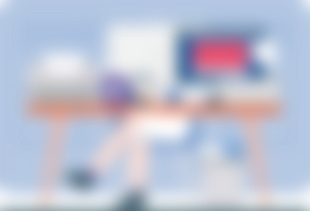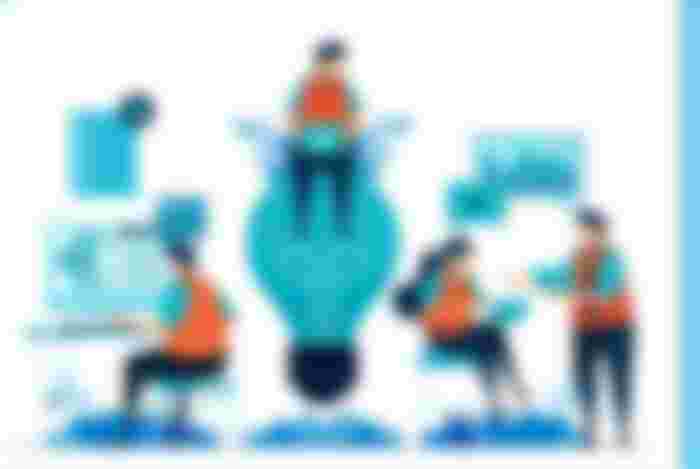From Pixels to Projects – What Does a Graphic Designer Actually Do?
You may have seen graphic designers at work and wondered what it is they actually do. Do they just play around with pixels all day? Or is there more to it than that?

In truth, graphic design is a complex and multi-faceted field. There's a lot more to it than just making things look pretty. A good graphic designer needs to be able to think outside the box, be creative, and have an eye for detail.
In this article, we'll take a look at the different aspects of graphic design and what goes into creating a successful project.
What Do Graphic Designers Do?
As a graphic designer, you'd be responsible for crafting the look and feel of a project. This could be anything from a logo to a website to an advertising campaign. You would be involved in every step of the process, from coming up with the initial concept to refining the final product.
But that's just the beginning. Graphic designers are also responsible for liaising with clients and managing projects from start to finish. You would need to be able to juggle multiple tasks at once and stay on top of deadlines.
It's a lot of work, but it's also a lot of fun. If you have a creative mind and enjoy working with pixels, then graphic design might just be the career for you!
What Skills Do You Need to Be a Graphic Designer?

So you want to be a graphic designer? That's great! But what skills do you need to succeed in this field?
First and foremost, you need to be able to think creatively. This means being able to come up with new and innovative ideas, and then translating those ideas into visually stunning designs.
Second, you need to be able to communicate effectively. As a graphic designer, you'll be working with clients, team members, and other stakeholders, so it's important to be able to communicate your ideas clearly and concisely.
Third, you need to be able to work well under pressure. Design projects can often be time-sensitive, so it's important to be able to stay calm and focused when things get hectic.
If you have these skills, then you're on your way to becoming a successful graphic designer!
What Are the Different Types of Graphic Design?
You might be wondering what types of projects a graphic designer might work on. And the answer is, it varies a lot.
According to 99design, there are 8 fundamental types of graphic design:
1. Visual identity graphic design – includes designing logos, typography, color palettes, and image libraries that represent a brand’s personality
2. Marketing & advertising graphic design – examples are postcards and flyers, magazine and newspaper ads, Vehicle wraps, posters, banners and billboards, signage, email marketing templates, PowerPoint presentations, menus, social media ads, banners and graphics, images for websites and blogs and more.
3. User interface (UI) graphic design – examples include web page design, theme design, game interfaces, and app design
4. Publication graphic design – examples include books, newspapers, newsletters, magazines, catalogs, and more.
5. Packaging graphic design
6. Motion graphic design – Examples include; advertisements, animated logos, promotional videos, websites and apps, video games, banners, and GIFs.
7. Environmental graphic design – Examples are; Signage, murals, office branding, public transportation navigation, retail store interiors, stadium branding, etc.
8. Art and illustration for graphic design - T-shirt design, graphic patterns for textiles, stock images, graphic novels, comic books, album art, book covers, picture books, infographics, etc.
What Are the Steps of the Graphic Design Process?
As a graphic designer, you know that every project is different. But there are some general steps that you follow every time. Let's take a look at them.
The first step is research. You need to understand the client's needs and the audience they're trying to reach. This is where your creative juices start flowing, and you come up with some initial ideas for the project.
Next is concept development, where you take those ideas and refine them into a specific concept that meets the client's requirements. Once you have a concept you're happy with, it's time for pre-production. This is where you create all of the assets needed for the project, like logos, illustrations, and typography.
Once everything is ready, it's time for production. This is where you put it all together and create the final product. And last but not least, post-production AKA quality control. This is where you make sure everything looks perfect and meets your high standards.
Design Thinking
There's a lot that goes into graphic design. It's not just all about coming up with cool designs and making things look pretty. In fact, a big part of the job is about design thinking. This is a process that helps you come up with creative solutions to problems. It involves understanding the customer's needs and then brainstorming possible solutions.
Design thinking is all about finding the best possible solution for the customer, and it's a skill that's in high demand these days. So if you're interested in graphic design, make sure you learn how to think creatively!
How Do You Become a Graphic Designer?
So you want to become a graphic designer? That's great! But where do you start? Well, the first thing you need to do is get some learning. A degree in graphic design can be a good place to start, but there are also plenty of online courses and workshops that can teach you the basics.
Once you have the basics down, it's time to start putting your skills to use. Start by creating a portfolio of your work, and make sure to showcase your best designs. Then start reaching out to local businesses and see if they need any help with their branding or marketing.
The more experience you get, the better you'll become, and before you know it, you'll be a professional graphic designer!
What Are the Top Graphic Design Trends of 2022?
So, what's the graphic design landscape going to look like in 2022? Here are some of the top trends we're predicting:
More hand-drawn elements.
Geometric shapes and patterns.
Bright and bold colors.
Use of illustrations.
More experimental typography.
Retro and vintage designs.
Transparency and layering effects.
Closing Thought
As a graphic designer, you may be responsible for everything from the design of a logo to the layout of a website. But what does that actually involve?
In short, it means working with images, typography, layout, and other design principles and design elements to create designs that are both appealing and effective.
Graphic designers may work for clients or companies in-house and may be responsible for everything from initial concepts to the final product.
If you're interested in pursuing a career in graphic design, get in touch with your local art school or design agency or network with professional designers to find out more about the opportunities available to you.


Graphic design may seem easy at first glance, but it is actually a complex and challenging field. I should know – I’m a graphic designer myself. It takes years of practice and experimentation to truly master the art of graphic design.